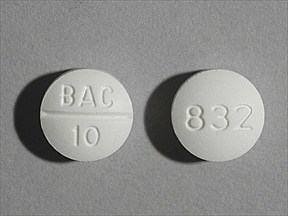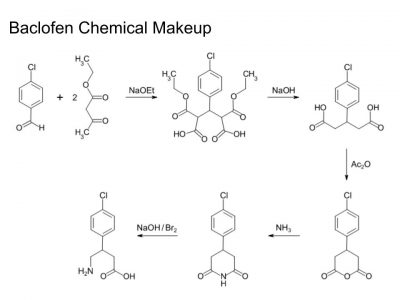Baclofen Addiction
Originally designed to assist people struggling with epilepsy, Baclofen helps control muscle spasms. In addition, the drug offers minor pain relief by relaxing the muscles. It is a pain reliever that is also capable of providing a euphoric high, hence having the potential for addiction. Attempting to detox and recover from Baclofen addiction without professional help is difficult.

At Ambrosia Treatment Center in West Palm, Florida, we utilize the latest evidence-based treatments to help individuals overcome addiction. Our facility includes contingency management and cognitive-behavioral therapy to help people suffering from Baclofen addiction. These treatments have proven to be effective for our clients with substance abuse issues.
 Coming under the brand names of Kemstro®, Gablofen®, and Lioresal®, Baclofen is a skeletal muscle relaxant that works very similarly to drugs like Gabapentin. These drugs block the nerve impulses that cause spasms and pain. It works like the gamma-aminobutyric acid (GABA) neurotransmitters which naturally occur in the brain sending nerve impulses to each other. Baclofen can block the activity of nerves within the part of the brain that controls the skeletal muscles and their contraction and relaxation. It does share characteristics of other narcotics such as Tramadol but is not part of this drug classification.
Coming under the brand names of Kemstro®, Gablofen®, and Lioresal®, Baclofen is a skeletal muscle relaxant that works very similarly to drugs like Gabapentin. These drugs block the nerve impulses that cause spasms and pain. It works like the gamma-aminobutyric acid (GABA) neurotransmitters which naturally occur in the brain sending nerve impulses to each other. Baclofen can block the activity of nerves within the part of the brain that controls the skeletal muscles and their contraction and relaxation. It does share characteristics of other narcotics such as Tramadol but is not part of this drug classification.
Baclofen can be taken orally or by injection and when taken by mouth, the gastrointestinal tract quickly absorbs it. In addition, it is also used to treat muscle spasms in multiple sclerosis patients, cerebral palsy, or those suffering from other spinal cord diseases. Although ts is still in an experimental phase, another ‘off-label’ usage for Baclofen is taking it to help in addiction treatment to other narcotics and controlled substances.
A prescribing doctor will typically begin with an initial dosage of 5mg of Baclofen, but may increase the dosage to 10mg tablets if necessary. However, Baclofen comes in 10mg and 20mg dosages and can be increased up to 100mg as needed. As with many drugs that create a calming sensation, there is an opportunity for dependence to develop.
Is Baclofen Addictive?
Those who feel they desperately need the effects of Baclofen to function normally or who are unable to quit taking it are suffering from an addiction to the substance and should seek help immediately.
Baclofen Addiction Side Effects
- Dizziness
- Drowsiness or fatigue
- Headache
- Insomnia
- Nausea or upset stomach
- Muscle weakness
- Difficulty Breathing
- Seizures
- Changes to behavior or mood (depression, anxiety, etc.)
- Confusion or Agitation
- Hallucinations
If you are using Baclofen whether by prescription or recreationally and experience any of these symptoms it is important to speak with a doctor or seek medication attention. Baclofen is commonly mixed with other drugs such as opioids, alcohol, or amphetamines to increase the high feeling these drugs cause. This greatly increases the chances of an overdose, however. If this happens, seek out medical attention right away.
Overcoming Baclofen addiction can be challenging, and it’s best to have professional support. At Ambrosia Treatment Center we are here to help you every step of the way on your journey to recovery.
How Long Does Baclofen Withdrawal Last?
Signs and Symptoms of Baclofen Withdrawal
The following are possible signs and symptoms of baclofen withdrawal:
- Dizziness or lightheadedness
- Erratic, involuntary movements
- Dangerously high body temperature
- Muscle stiffness
- Muscle pain
- Unstable blood pressure
- Breathing difficulties
- Itchiness
- Anxiety and agitation
- Confusion
- Psychosis
- Hallucinations and delusions
- Seizure
The pain of withdrawal can be a significant obstacle on the path of recovery. If a person has been unable to get through withdrawal on their own, they may need professional care. At Ambrosia Treatment Center in South Florida, our detox program can help people complete baclofen withdrawal safely and with as little discomfort as possible.
How Long Does Baclofen Withdrawal Last?
Baclofen Withdrawal Timeline
The effects of baclofen can begin to wear off in a few hours. This is why people who take prescription baclofen are typically told to take the medication multiple times each day.
In terms of withdrawal, it can take 10-20 hours for baclofen to be eliminated from the body. This means that withdrawal symptoms can begin to develop within a few hours. In some cases, though, it may take a day or more after a person’s last dose before they start to have withdrawal symptoms.
Within 48 hours of a person’s final dose, they should experience some symptoms of baclofen withdrawal. The severity of these symptoms can depend on several factors, including whether they tapered their baclofen use or simply quit without first gradually reducing the amount of the drug they had been taking.
Usually, baclofen withdrawal symptoms will be at their most severe about 72 hours after a person stopped taking the drug. After the 72-hour mark, symptoms will typically begin to subside, though some symptoms may persist for several days or even weeks.
Find Medical Detox for Baclofen Withdrawal
- Does the detox offer both therapeutic and medical support?
- What are the qualifications of the professionals who provide care in the detox program?
- Does the treatment center offer other levels of care, so you can transition into baclofen addiction treatment after you’ve completed withdrawal?
- If the center offers other levels of care, do their services include both inpatient and outpatient options?
When you’re searching for baclofen detox or other types of baclofen addiction treatment, what’s most important is finding the facility that best matches your specific needs. Detox and addiction treatment can take several forms. Find the place whose services align most closely with your goals and preferences.
How Can You Tell if You Are Addicted to Baclofen?
- Lying about Baclofen use
- Attempting to get extra doses
- Neglecting social habits and responsibilities
- Spending large amounts of money on the drug
- Obsessive thoughts about the drug
- Failed attempts to quit or a refusal to quit
When attempting to quit using Baclofen there can be a number of unpleasant withdrawal symptoms including anxiety, confusion, convulsions, and even psychosis and tachycardia (an irregular heartbeat).
If you or a loved one are suffering from an addiction to Baclofen or is trying to quit, seeking professional help is the best way to successfully deal with it. You owe it to yourself to feel empowered to take control of your life again.

Baclofen Addiction Treatment Center in West Palm, FL
Visit our admissions process page today, or give us a call now at 888-492-1633 to get start your recovery. You’re in the right place to make real change.

Dr. Alam is an internationally renowned psychiatrist with academic affiliations with Northwestern University and University of Illinois, Chicago where he completed his residency training. He has been a principal investigator for over forty studies and has been involved in research leading to the approval of most psychiatric medications currently on the market. He is the founder of the Neuroscience Research Institute which continues to conduct research on cutting edge medication and interventional psychiatry. Dr. Alam is a Distinguished Fellow of the American Psychiatric Association and the American Society of Addiction Medicine. He has won several awards and has been featured extensively on radio and television.







